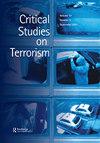Kurdish “patriotic” families: an incentive or an impediment to joining the PKK through the generations and according to gender
IF 2.5
Q2 POLITICAL SCIENCE
引用次数: 0
Abstract
ABSTRACT Participation in national liberation struggles is often considered to be a “family tradition”. The academic literature has taken up the idea that every Kurdish family should “give a child” to the guerrilla movement. These assertions have rarely been based on qualitative data. To examine the role of family traditions on the militant trajectories of the Partiya Karkerên Kurdistan (PKK), we met 64 of its guerrilla fighters from three consecutive generations, encompassing a broad militancy period from the mid-1980s until today. This article highlights the variable impact of primary socialisation processes, in particular, the patriotic family, according to the generations and gender, suggesting that retrospective narratives made by PKK militants themselves reflect reluctance among their family members towards their engagement in the clandestine struggle.库尔德人的“爱国”家庭:世世代代、按性别划分,是加入库尔德工人党的动力还是障碍
参与民族解放斗争通常被认为是一种“家族传统”。学术文献采纳了这样一种观点:每个库尔德家庭都应该给游击队运动“送一个孩子”。这些断言很少是基于定性数据的。为了研究家庭传统在Karkerên库尔德工人党(PKK)的战斗轨迹中所起的作用,我们会见了64位连续三代的游击战士,涵盖了从20世纪80年代中期到今天的广泛战斗时期。这篇文章强调了主要社会化过程的可变影响,特别是爱国家庭,根据代际和性别,表明库尔德工人党武装分子自己的回顾性叙述反映了他们的家庭成员对参与秘密斗争的不情愿。
本文章由计算机程序翻译,如有差异,请以英文原文为准。
求助全文
约1分钟内获得全文
求助全文

 求助内容:
求助内容: 应助结果提醒方式:
应助结果提醒方式:


